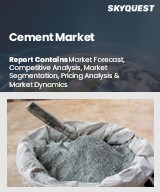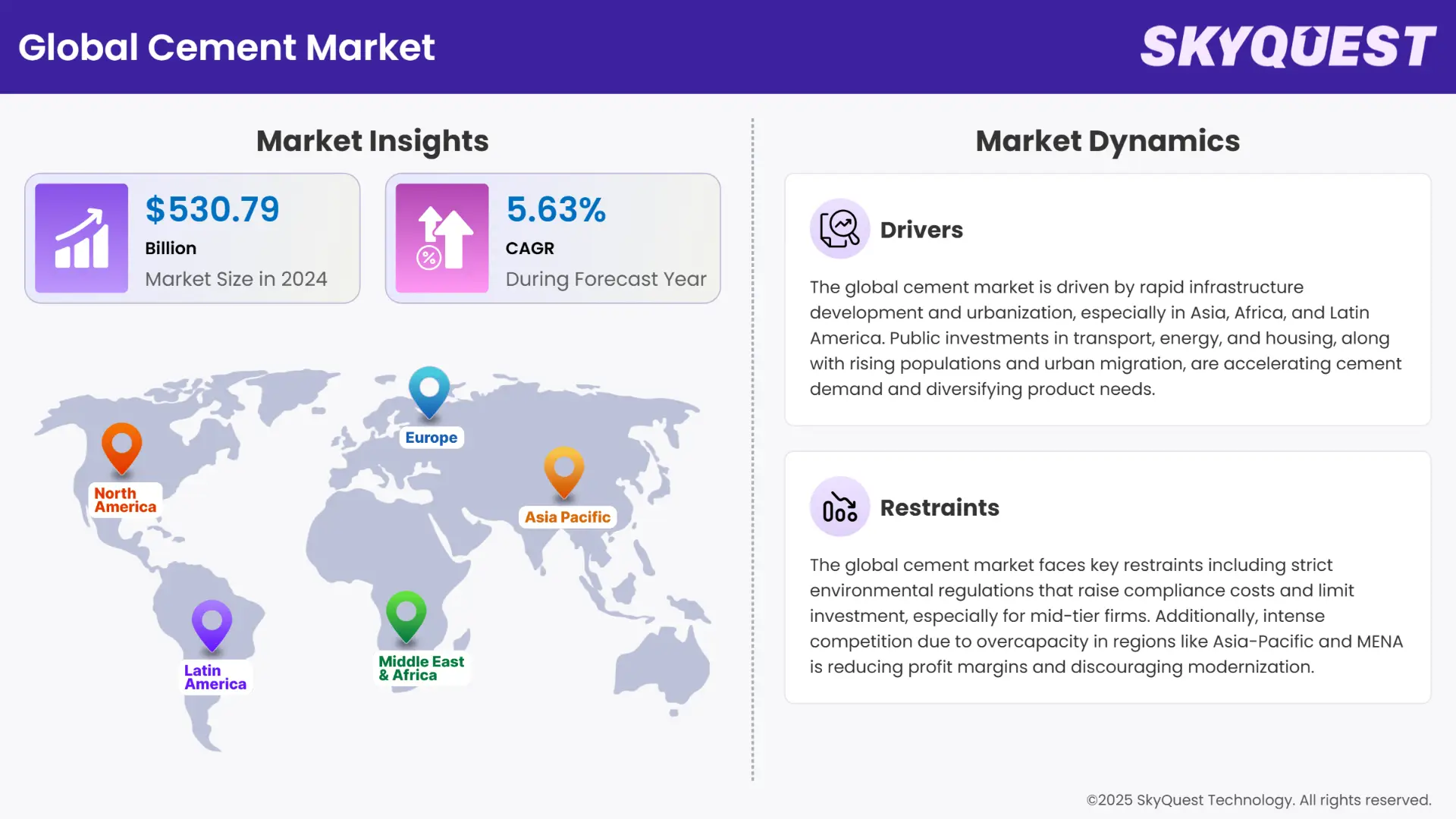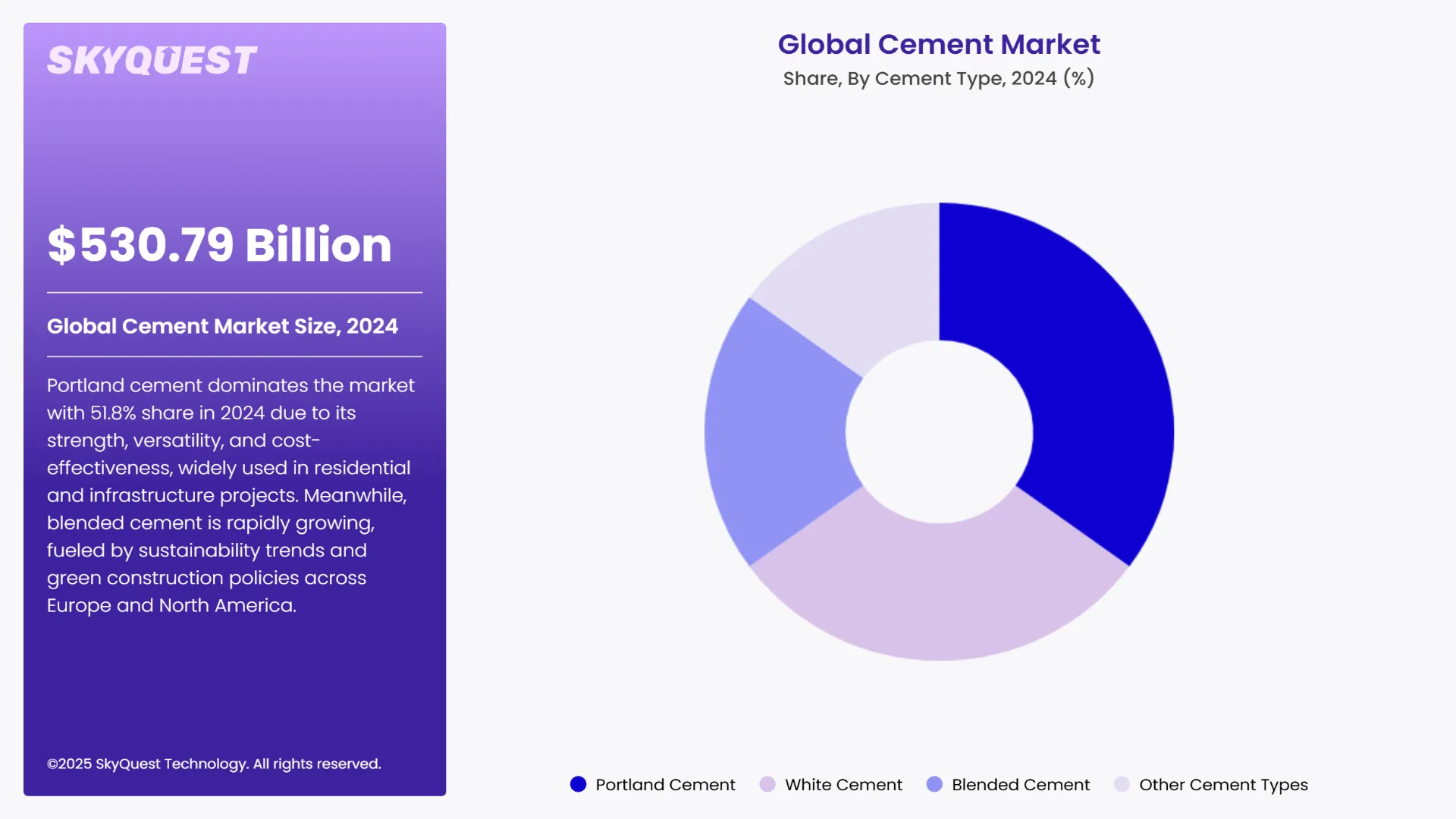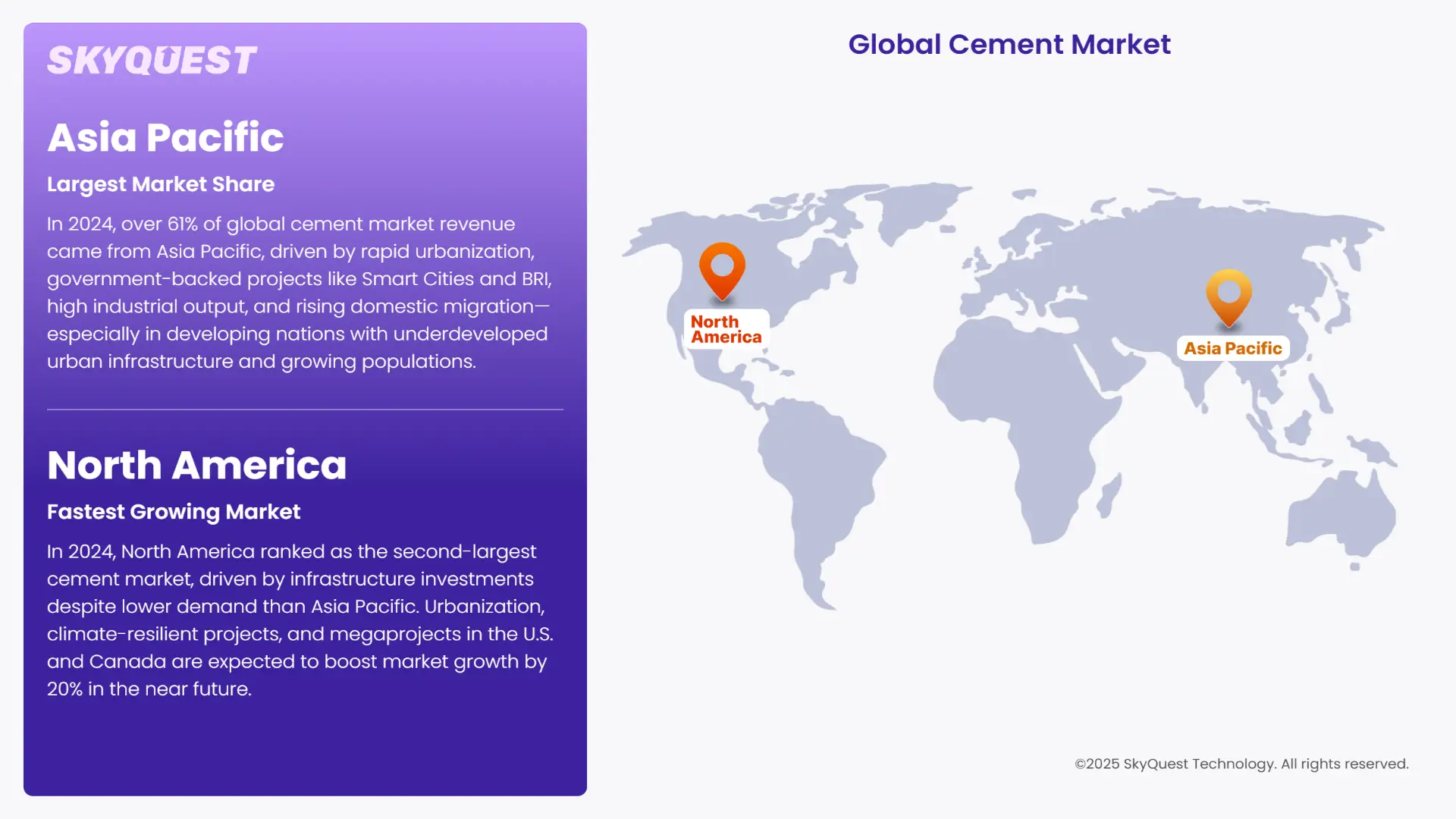
Report ID: SQMIG15F2024

Report ID: SQMIG15F2024
sales@skyquestt.com
USA +1 351-333-4748

Report ID:
SQMIG15F2024 |
Region:
Global |
Published Date: May, 2025
Pages:
197
|Tables:
146
|Figures:
78



Global Cement Market size was valued at USD 530.79 Billion in 2024 and is poised to grow from USD 560.67 Billion in 2025 to USD 868.98 Billion by 2033, growing at a CAGR of 5.63% in the forecast period (2026–2033).
The demand for residential construction has increased as the population has grown. Cement demand has risen dramatically over the world as a result of this. The growing need for public infrastructure and non-residential buildings, such as hospitals and healthcare centers, has created a Cement Market for products. As a result, the present market trend is increased demand from the booming construction industry.
Also, innovations in cement such as increased sustainability with less environmental impact and water-proofing functionalities have gained consumer attraction. Just a year ago in June 2024, the Indonesian Government released a note that they are willing to ensure sustainable construction in the new national capital Nusantara by using green cement supplied by state-owned PT Semen Indonesia (SIG). The longer lifespan is the main thing behind its adoption. As green cement is highly durable and has a long lifespan, green cement is 20% stronger than Portland Cement in 28 days and continues to gain long-term strength. Thus, there is a high demand for Green Cements noted in the last few years.
Moreover, to fulfill this increased demand the core material limestone’s production capacity has been increased also. Due to increased demand from the cement end-user industry, the cement production capacity is expected to grow more than 50% year on year in the projected time frame.
How Sustainable Cement Innovations Like Green Cement Are Set to Create More Growth Opportunities for Cement Manufacturers?
Innovative new sustainable cements such as green cement, have some unique advantages for manufacturers. These can provide sustainable solutions to the environmental ills and the hassle with compliance and regulation responsibilities. In addition to this, green cement has CO₂ emissions reduction of up 40% per metric tonne, which satisfies targets for net-zero around the world. For example, in India, ACC Limited is applying green cement to sustain infrastructure projects under LEED when supplied through the system. In addition, government action and stricter environmental rules are forcing the industry to innovate. There is the advantage of compliance bonus, but more importantly is the availability of premium niche markets which allow manufacturers to differentiate their products, and gain access to vast, well-developed and suddenly rapidly growing sustainable building products and construction markets.

To get more insights on this market click here to Request a Free Sample Report
The global cement market is segmented into cement type, technology, mode of sales, industry, end user and region. By cement type, the market is segmented into portland cement, white cement, blended cement and other cement types. By product, the market is segmented into green cement and conventional cement. By mode of sales, the market is segmented into direct sales, retail sales and others. By industry, the market is segmented into residential, commercial, infrastructure and others. By end user, the market is segmented into construction companies, real estate developers, individual buyers and others. By region, the cement market is analyzed across North America, Europe, Asia-Pacific, Middle East & Africa, and Latin America.
Portland cement is the most preferred choice for concrete mixtures. This cement category provides more strength to ceilings, beams and joints. This cement's strength, versatility, and low cost are also the reason this cement is being used not only in residential applications but also in infrastructures. As per our research, Portland Cement accounted for around 51.8% in 2024 and it will continue to lead the global cement market, due to most of the end-use industry using it. There are several reasons this market share is calculated. With its high compressive strength, easy availability, and traditional uses for roads, pavement, bridges, and tall structures, the position is only strengthened. In addition, favorable government policies for upgrading infrastructure, and knowingly solidifying cement's use, especially in the developing countries of India, Indonesia, and Nigeria add to large-scale consumption. Overall, Portland Cements' versatility and cost-effectiveness are both helping the share to become entrenched.
On the other hand, the Blended Cement category is emerging as the fastest-growing sub-segment, driven by global trends emphasizing sustainability and carbon reduction. Blended cement, which incorporates supplementary materials like fly ash, slag, and silica fume, is gaining momentum due to its lower carbon footprint and enhanced durability. All these trends suit the new blended cement market well, and there continues to be significant momentum behind green construction initiatives throughout Europe and North America, as well as favorable environmental policies.
SkyQuest's market study indicates that the residential segment account for the highest market share around 62.7% of all cement end-use industry in the global cement market by 2024, owing to rapid urbanization, a growing population, and the demand for affordable housing in emerging economies of India, China, and Southeast Asian nations. In India, for example, government initiatives like the Pradhan Mantri Awas Yojana (PMAY), along with China's ongoing investments in rural and urban housing projects, are key reasons for the increased consumption of cement.
Moreover, the infrastructure segment will continue to be the fastest-growing sub-segment in the global cement market, resulting from ambitious government infrastructure programs and increased public-private investments. Accelerating cement consumption will come from large infrastructure projects such as the Belt and Road Initiative in China, the Smart Cities Mission in India, and large transportation and energy infrastructure development projects in Africa and Latin America.

To get detailed segments analysis, Request a Free Sample Report
Our study found in 2024, the cement market has generated more than 61% of the total revenue from the Asia Pacific region. This strong share reflects the higher rate of urbanization and population in the region. Governments of APAC countries are supporting urbanization to follow the pace of this revolving world. Smart Cities projects, PM Awe's Yojna, Belt and Road Initiative (BRI), Redevelopment project and other new projects are in the pipeline. Additionally, high industrial production and increasing domestic migration within heavily populated economies are driving demand for cement, particularly in developing economies where urban infrastructure is still underdeveloped.
China Cement Market
China is the largest consumer of cement which reflects numerous market players in this country. SkyQuest study found that in 2024 the country has recorded a production capacity of 1.81 Bn tons/year and an estimated clinker utilization rate of 53%. This increased demand is fueled by ambitious infrastructure modernization and rural revitalization initiatives. Even after a real estate deceleration, the Chinese government is still spending on highways, green energy areas, and intercity transport systems. The nation's Belt and Road Initiative (BRI) also increases regional cement demand by enabling development across partner nations.
India Cement Market
India cement market is one of the fastest-growing countries in the APAC region, due to the country's higher investment in the real-estate and government focus on urbanization. As per the IBEF report, the real estate sector in India shows significant growth with a projected 9.2% CAGR from 2023 to 2028. The market has picked a pace with urbanization, rental market expansion, and property price appreciation in 2024. Additionally, schemes like PM Gati Shakti, Smart Cities Mission, and Bharatmala have created strong demand across roadways, rail, and metro schemes. India's transition towards low-carbon composite cement and capacity increases in leading players such as Ultratech and ACC also fast-track domestic consumption patterns.
Japan & South Korea Cement Market
As urbanization is the most prominent driver across the Asia-Pacific for the cement market, countries like Japan and South Korea have comparatively more matured cement markets, their demand continues to be stable on account of earthquake-resistant reconstruction and climate-resilient infrastructure investment. Japan's aging network infrastructure and redevelopment of transport routes in anticipation of coming global events are major drivers. Smart city construction and upgrading industrial facilities in South Korea remain supportive of demand. Both nations are also pushing innovation in sustainable cement and circular construction methods, driving market development despite diminished growth rates.
In North America, more than 82% of the population lives in urban areas. Thus, the demand is less for cement as compared to the Asia Pacific region. However, our research indicates the demand for cement is expected to rise as new construction projects are in the pipeline including government infrastructure projects and commercial buildings. As a result, the government-boosted infrastructure projects will create opportunities for cement manufacturers which require precise eye tenders and deals. Our analysis found that the cement market has generated the second-largest revenue from the North American region which positioned it as the second-largest cement market in 2024 market analysis. In addition, North America is expected to expand by 20% in the near future. This growth is fueled by climate-resilient infrastructure investment, particularly in the U.S. and Canada, in addition to the demand for precast and ready-mix concrete solutions in megaprojects such as highway construction, renewable energy facilities, and logistics centers.
The U.S. Cement Market
The U.S. is a fundamental market in North America, with its building industry generating more than 4% of national GDP. Cement usage has consistently risen, totaling an estimated 110 million metric tons in 2024, an indication of growing demand in both residential and commercial markets. Mega infrastructure legislation, robust housing completions, and higher cement usage in sustainable and green construction schemes are major drivers. The penetration of innovative cement products and domestic sourcing initiatives also contribute to U.S. market resilience amid shipment variations.
Canada Cement Market
As per the recent trade data, In February 2025 alone, Canada shipped out USD 29.7 million worth of cement while importing just USD 9.5 million, generating a trade surplus of USD 20.2 million. Within a month from January 2025 to February 2025, Canada's cement industry experienced an increase of 15.7%. Behind this export growth is the support of the U.S. and foreign demand, as well as Canada's efficient production and domestic concern for environmentally friendly types of cement. Further, government expenditure on low-cost housing and climate-resilient infrastructure is likely to drive domestic cement demand over the next few years.

To know more about the market opportunities by region and country, click here to
Buy The Complete Report
Surging Infrastructure Development
Rising Urbanization and Population Growth
Environmental Regulations
Intense Market Competition
Request Free Customization of this report to help us to meet your business objectives.
The global cement market is moderately to highly competitive, as there are high capital requirements for entry, numerous environmental regulations, and small room for new entrants due to the top-5 players, China National Building Material Co Ltd, CRH Plc, Anhui Conch Cement Co Ltd, Holcim Ltd, and HeidelbergCement AG capturing around 39% of the global cement market. A new company can differentiate itself by focusing on niche industries, sustainable products, advanced manufacturing processes, and regional partnerships. Companies that have strong distribution networks, low-cost production, brand name reputation, innovation in low-carbon cement, and M&A activities to strengthen their business model enhance market share by being competitive in the global cement market.
SkyQuest’s ABIRAW (Advanced Business Intelligence, Research & Analysis Wing) is our Business Information Services team that Collects, Collates, Correlates, and Analyses the Data collected using Primary Exploratory Research backed by robust Secondary Desk research.
SkyQuest's study suggests that the forecast year is expected to show continuous growth as a reflection of higher adoption of cement worldwide. This is because of growing urbanization, population growth, and a push for development from growing governments. At the same time, there is a structural shift occurring with sustainable cement solutions including both green and blended cement becoming more popular because of the environmental benefits and durability over time. Significant innovations in the market continue to focus on carbon reduction and comply with ever-evolving regulations that will create growth opportunities for manufacturers. As competition remains high, manufacturers who prioritize sustainability, efficiency, and differentiated products remain well-positioned to take advantage of future growth opportunities in this evolving sector.
| Report Metric | Details |
|---|---|
| Market size value in 2024 | USD 530.79 Billion |
| Market size value in 2033 | USD 868.98 Billion |
| Growth Rate | 5.63% |
| Base year | 2024 |
| Forecast period | 2026–2033 |
| Forecast Unit (Value) | USD Billion |
| Segments covered |
|
| Regions covered | North America (US, Canada), Europe (Germany, France, United Kingdom, Italy, Spain, Rest of Europe), Asia Pacific (China, India, Japan, Rest of Asia-Pacific), Latin America (Brazil, Rest of Latin America), Middle East & Africa (South Africa, GCC Countries, Rest of MEA) |
| Companies covered |
|
| Customization scope | Free report customization with purchase. Customization includes:-
|
To get a free trial access to our platform which is a one stop solution for all your data requirements for quicker decision making. This platform allows you to compare markets, competitors who are prominent in the market, and mega trends that are influencing the dynamics in the market. Also, get access to detailed SkyQuest exclusive matrix.
Table Of Content
Executive Summary
Market overview
Parent Market Analysis
Market overview
Market size
KEY MARKET INSIGHTS
COVID IMPACT
MARKET DYNAMICS & OUTLOOK
Market Size by Region
KEY COMPANY PROFILES
Methodology
For the Cement Market, our research methodology involved a mixture of primary and secondary data sources. Key steps involved in the research process are listed below:
1. Information Procurement: This stage involved the procurement of Market data or related information via primary and secondary sources. The various secondary sources used included various company websites, annual reports, trade databases, and paid databases such as Hoover's, Bloomberg Business, Factiva, and Avention. Our team did 45 primary interactions Globally which included several stakeholders such as manufacturers, customers, key opinion leaders, etc. Overall, information procurement was one of the most extensive stages in our research process.
2. Information Analysis: This step involved triangulation of data through bottom-up and top-down approaches to estimate and validate the total size and future estimate of the Cement Market.
3. Report Formulation: The final step entailed the placement of data points in appropriate Market spaces in an attempt to deduce viable conclusions.
4. Validation & Publishing: Validation is the most important step in the process. Validation & re-validation via an intricately designed process helped us finalize data points to be used for final calculations. The final Market estimates and forecasts were then aligned and sent to our panel of industry experts for validation of data. Once the validation was done the report was sent to our Quality Assurance team to ensure adherence to style guides, consistency & design.
Analyst Support
Customization Options
With the given market data, our dedicated team of analysts can offer you the following customization options are available for the Cement Market:
Product Analysis: Product matrix, which offers a detailed comparison of the product portfolio of companies.
Regional Analysis: Further analysis of the Cement Market for additional countries.
Competitive Analysis: Detailed analysis and profiling of additional Market players & comparative analysis of competitive products.
Go to Market Strategy: Find the high-growth channels to invest your marketing efforts and increase your customer base.
Innovation Mapping: Identify racial solutions and innovation, connected to deep ecosystems of innovators, start-ups, academics, and strategic partners.
Category Intelligence: Customized intelligence that is relevant to their supply Markets will enable them to make smarter sourcing decisions and improve their category management.
Public Company Transcript Analysis: To improve the investment performance by generating new alpha and making better-informed decisions.
Social Media Listening: To analyze the conversations and trends happening not just around your brand, but around your industry as a whole, and use those insights to make better Marketing decisions.
REQUEST FOR SAMPLE
Global Cement Market size was valued at USD 530.79 Billion in 2024 and is poised to grow from USD 560.67 Billion in 2025 to USD 868.98 Billion by 2033, growing at a CAGR of 5.63% in the forecast period (2026–2033).
China National Building Material Co Ltd, Anhui Conch Cement Co Ltd, CRH Plc, HeidelbergCement AG, Holcim Ltd, CEMEX S.A.B. de C.V., InterCement Participações S.A., The Siam Cement Group, TITAN Cement Company, Taiheiyo Cement Corporation, UltraTech Cement Ltd, JSW Cement Ltd., Votorantim Cimentos S.A., Buzzi SpA, Shree Cement Ltd., Birla Corporation Ltd., ACC Ltd, Dalmia Bharat Ltd., Grupo Argos S.A., Dangote Cement Plc
The key driver of the cement market is the rising demand for infrastructure development, including residential, commercial, and industrial construction projects, supported by urbanization, population growth, and government investments in transportation and public works.
A key market trend in the cement market is the increasing adoption of sustainable and low-carbon cement production technologies, including the use of alternative fuels, supplementary cementitious materials, and energy-efficient manufacturing processes to reduce environmental impact.
Asia-Pacific accounted for the largest share in the cement market, driven by rapid urbanization, large-scale infrastructure projects, strong construction activity, and high demand from countries such as China and India.
Want to customize this report? This report can be personalized according to your needs. Our analysts and industry experts will work directly with you to understand your requirements and provide you with customized data in a short amount of time. We offer $1000 worth of FREE customization at the time of purchase.
Feedback From Our Clients